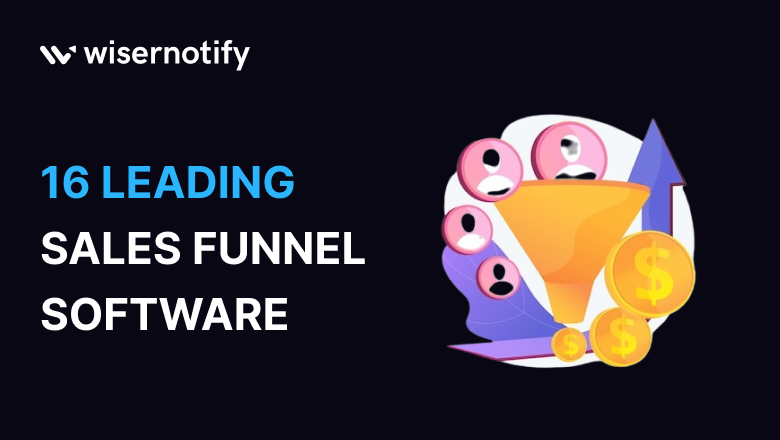Have you ever wondered why some websites effortlessly convert visitors into customers while others struggle to generate leads?
The secret often lies in a strategic marketing tool known as a sales funnel.
Imagine a well-designed maze guiding visitors through a series of steps that culminate in a desired action, like making a purchase or signing up for a service.
Sales funnels operate on a similar principle.
They act as meticulously crafted roadmaps, guiding website visitors on a journey from initial awareness to final conversion.
In today’s digital marketing landscape, sales funnels are no longer a luxury but a necessity.
Studies show that businesses with well-defined sales funnels convert website visitors into customers at a staggering 30% higher rate.
By strategically nurturing leads and providing a clear path to conversion, sales funnels empower businesses to maximize their ROI and achieve sustainable growth.
This guide will equip you with the knowledge to understand the different stages of a sales funnel, explore the benefits of using them, and ultimately leverage the power of sales funnel software to transform your website into a lead-generation machine.
We’ll also explore 16 popular sales funnel software options, helping you choose the tool that best suits your specific business needs and budget.
Start Free Trial
Highlight real-time activities like reviews, sales & sign-ups.
Stages of Sales Funnel
Every effective sales funnel follows a customer journey, guiding potential buyers from initial awareness to a final purchase decision.
Here’s a breakdown of the key stages involved:
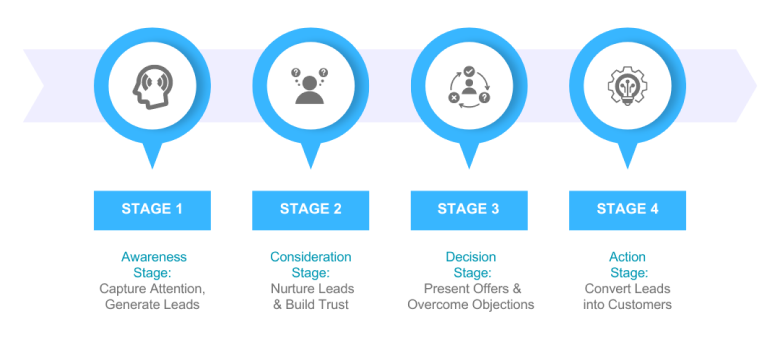
1. Awareness Stage: Capture Attention & Generate Leads
This initial stage focuses on grabbing your target audience’s attention and introducing them to your brand.
Here are some key strategies:
Compelling Content: Create valuable content (blog posts, infographics, videos) that addresses your audience’s pain points and establishes you as a thought leader.
Social Media Engagement: Leverage social media platforms to connect with potential customers, share industry insights, and build brand awareness.
Search Engine Optimization (SEO): Optimize your website and content for relevant keywords to improve search engine ranking and attract organic traffic.
The overall goal of the awareness stage is to capture attention, generate leads, and nurture their interest in your offerings.
2. Consideration Stage: Nurture Leads & Build Trust
Once potential customers are aware of your brand, the consideration stage focuses on nurturing leads and building trust.
Here’s how:
Targeted Email Marketing: Segment your leads based on interests and behavior, and send targeted email campaigns with valuable information and offers relevant to their needs.
Lead Nurturing Workflows: Develop automated email sequences that educate leads about your products or services, address common concerns, and showcase customer testimonials.
Webinars & Free Content: Offer informative webinars or downloadable resources (e.g., white papers, ebooks) to establish yourself as an expert and provide additional value to potential customers.
By providing valuable content and building trust, you can move leads further down the funnel toward a purchase decision.
3. Decision Stage: Present Offers & Overcome Objections
In the decision stage, potential customers are actively considering their options.
Here’s your chance to present compelling offers and address any lingering doubts:
Free Trials & Demos: Offer free trials or product demonstrations to allow potential customers to experience your offerings firsthand.
Case Studies & Testimonials: Showcase real-world success stories and positive customer testimonials to build trust and social proof.
Address Objections: Anticipate common objections potential customers might have and provide clear, concise answers that address their concerns.
By effectively presenting your offer and overcoming objections, you can nudge leads toward a final purchase decision.
4. Action Stage Convert Leads into Customers
The action stage is where the conversion magic happens.
Here, you want to make the buying process as smooth and frictionless as possible:
Clear Calls to Action (CTAs): Include clear and compelling CTAs throughout your funnel, directing leads towards the next desired action (e.g., “Buy Now,” “Sign Up for Free Trial”).
Optimize Checkout Process: Ensure your checkout process is user-friendly and secure to minimize cart abandonment.
Offer Incentives: Consider offering limited-time discounts or special promotions to incentivize immediate purchase decisions.
Understanding these distinct stages of your sales funnel is crucial for crafting targeted marketing messages and nurturing leads toward a successful conversion.
Start Free Trial
Highlight real-time activities like reviews, sales & sign-ups.
Benefits of Using Sales Funnels Tools
Sales funnels offer a powerful approach to streamlining your marketing and sales efforts, ultimately driving conversions and business growth.
Here’s how:
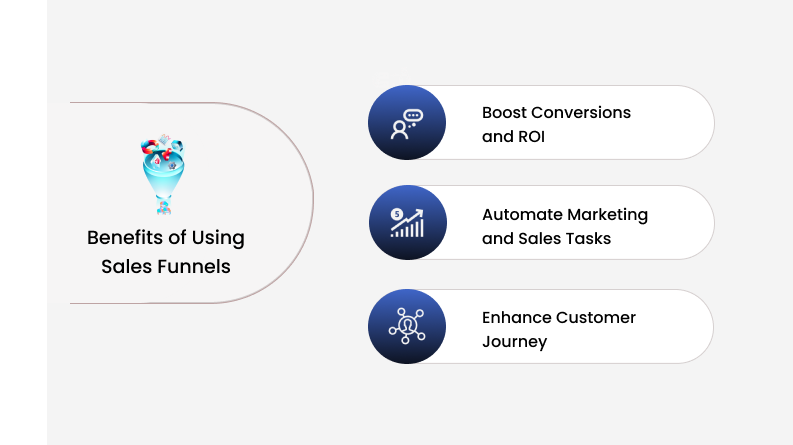
◾ Boost Conversions and ROI
Unlike scattered marketing efforts, sales funnels provide a targeted path for visitors, leading them toward a purchase.
With quantifiable data at every stage, you can identify areas for improvement and optimize your funnel for maximum ROI.
This data-driven approach allows you to continuously refine your strategy and convert website visitors into paying customers.
◾ Automate Marketing and Sales Tasks
Sales funnels automate repetitive tasks like lead nurturing, email sequences, and follow-up reminders.
This frees up your team’s valuable time for more strategic activities like customer relationship building and campaign development.
By streamlining the sales process and automating lead nurturing, you can establish predictable revenue streams based on traffic volume and conversion rates, allowing for better financial planning and resource allocation.
◾ Enhance Customer Journey
Sales funnels personalize the customer experience by tailoring content and offers based on user interests and progress within the funnel.
This fosters trust and guides them seamlessly toward a purchase decision.
Additionally, sales funnels provide valuable insights into customer behavior, allowing you to refine your funnel and continuously improve the overall customer journey.
Also see: 10 Sales Optimization Software for Serious Sales Growth
1. ClickFunnels
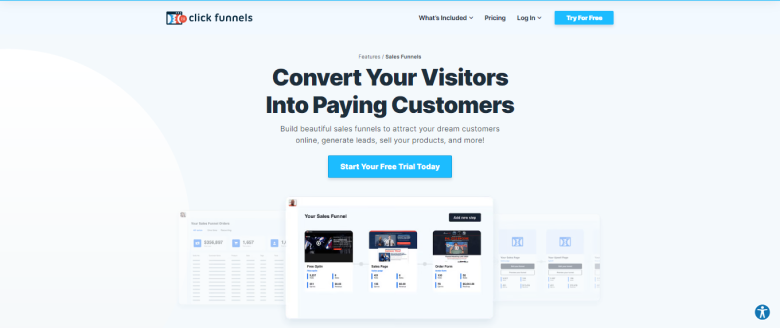
ClickFunnels is a popular all-in-one sales funnel builder known for its ease of use and drag-and-drop interface.
It offers a comprehensive suite of features for creating high-converting sales funnels, landing pages, email marketing campaigns, and membership sites.
Pros: Easy to use, comprehensive features, suitable for beginners and experienced users.
Cons: Limited customization options compared to some competitors, higher pricing plans for advanced features.
With a user base exceeding 450k, ClickFunnels is a popular choice for businesses of various sizes, particularly online coaching and consulting practices and affiliate marketers.
2. Kartra
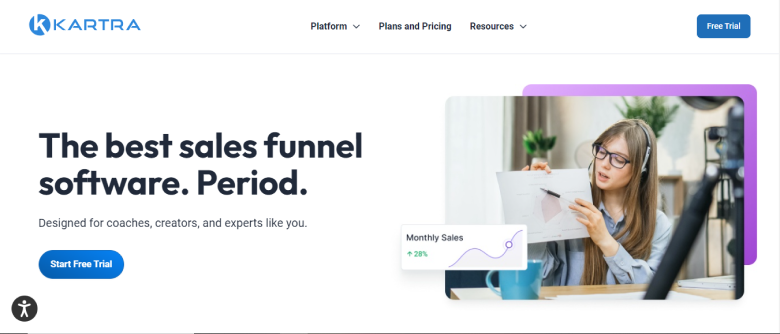
Kartra is a comprehensive marketing platform that combines sales funnel building, email marketing, video hosting, and membership site functionality.
It’s a good option for businesses seeking an all-in-one solution for their marketing needs.
Pros: All-in-one solution, including video hosting and appointment scheduling, suitable for businesses with diverse marketing needs.
Cons: Steeper learning curve compared to some competitors, higher pricing plans.
Kartra, used by over 30k users, is highly recommended for online coaching and consulting practices (especially those utilizing video content), course creators, and smaller marketing agencies.
3. Systeme.io
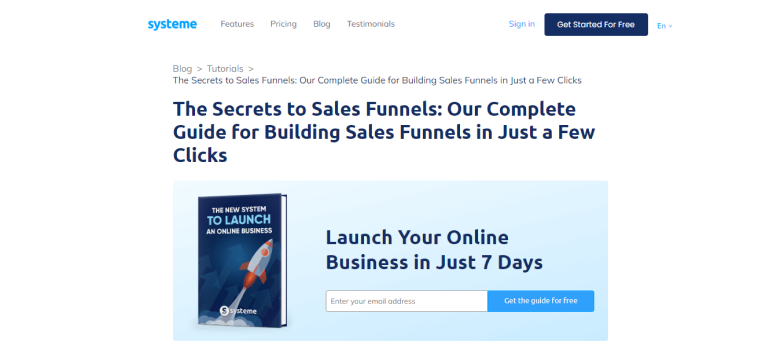
Systeme.io is a budget-friendly sales funnel platform that includes features for landing page creation, email marketing, online courses, and webinars.
It’s a good option for startups and small businesses looking for an affordable, all-in-one solution.
Pros: Affordable pricing, all-in-one features including online courses and blogging, user-friendly interface.
Cons: Limited customization options compared to more expensive platforms, may not be ideal for large-scale marketing campaigns.
With over 5k users, Systeme.io is an ideal option for creators, bloggers, and startups looking to build a community and host webinars and courses.
4. Kajabi
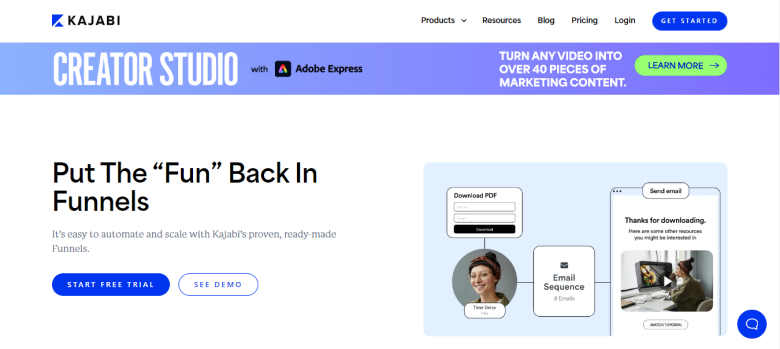
Kajabi is an all-in-one platform with powerful features for building sales funnels, creating online courses, managing memberships, and marketing your offerings.
Pros: All-in-one solution ideal for course creators, robust online course creation features, membership site functionality.
Cons: Pricing can be a barrier to entry compared to some competitors, with limited customization options for landing pages and sales funnels.
Focused on online education, Kajabi, with over 90k users, is a strong fit for online coaches with course-based offerings, course creators of all types, and consultants who provide online courses alongside their services.
5. GoHighLevel
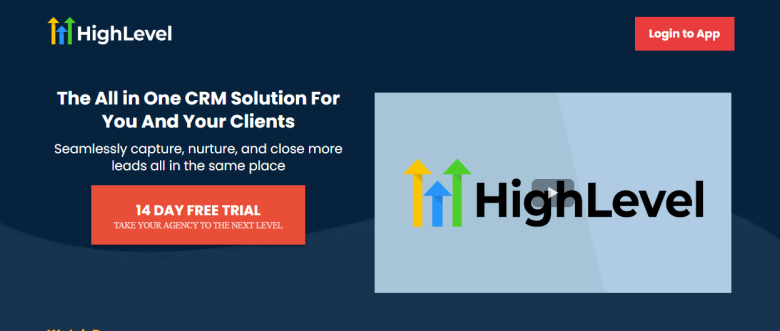
GoHighLevel is a powerful all-in-one marketing platform that offers comprehensive features for sales funnel building, email marketing, SMS marketing, CRM management, and appointment scheduling.
Pros: This feature-rich platform is ideal for advanced automation workflows, multi-channel marketing capabilities, CRM integration, and white-labeling options.
Cons: Steeper learning curve compared to some competitors, higher pricing plans.
GoHighLevel, exceeding 350k users, boasts robust features that cater to agencies, marketing consultants, and enterprises with complex marketing needs.
6. Thrive Suite
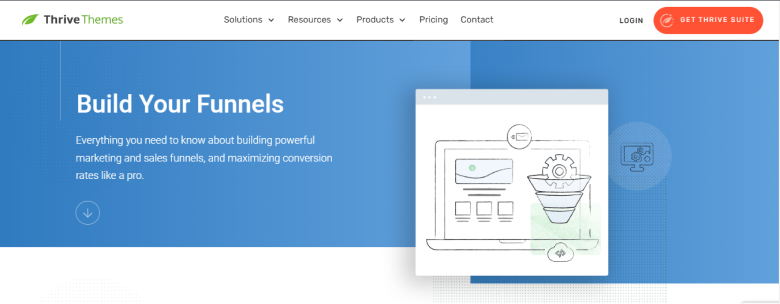
Thrive Suite is a collection of marketing tools bundled into one platform.
It includes features for creating landing pages, email marketing, webinar hosting, and courses, making it a good option for businesses that need a comprehensive marketing solution.
Pros: It’s an all-in-one suite for various marketing needs, has a user-friendly interface, and is a good option for creating online courses (higher-tier plans).
Cons: Limited marketing automation capabilities compared to dedicated platforms, can be expensive for access to all features.
Thrive Suite, used by over 300k users, is most suitable for bloggers and creators with content marketing needs and online coaches looking to incorporate online courses.
7. HubSpot

HubSpot is a comprehensive marketing automation platform with powerful features for building sales funnels, managing email marketing, automating workflows, and nurturing leads. It also offers a free CRM system for managing customer relationships.
Pros: Free CRM included, powerful marketing automation features, lead scoring and nurturing capabilities, detailed analytics, and reporting.
Cons: Steeper learning curve compared to some competitors, pricing plans can be expensive for larger businesses.
HubSpot, exceeding 1.4 million users, caters to businesses of various sizes, but its robust features are particularly suited for businesses that need advanced marketing automation.
This could include marketing agencies, established e-commerce stores, and larger B2B businesses.
8. GetResponse
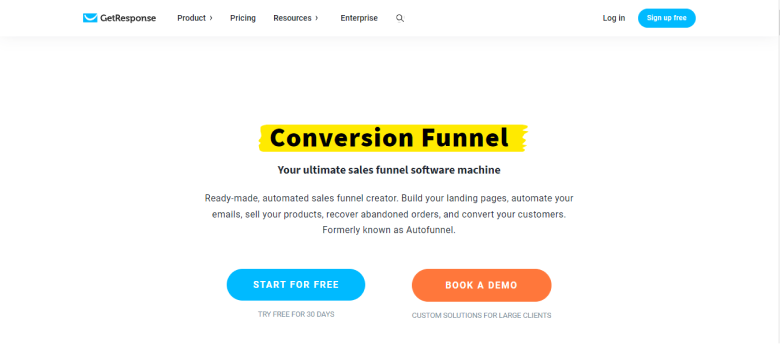
GetResponse is an email marketing and marketing automation platform that offers features for building landing pages, creating email campaigns, and automating marketing workflows.
Pros: Affordable pricing, user-friendly interface, good email marketing features, built-in webinar hosting, basic CRM included.
Cons: Limited landing page creation functionalities compared to dedicated builders, and less robust marketing automation features compared to high-end platforms.
GetResponse, with over 140k users, is a good fit for businesses on a budget that still need email marketing automation.
This could include bloggers looking to nurture their audience, startups with lead generation needs, and local businesses with basic marketing automation requirements.
9. Keap (Infusionsoft)

Keap (formerly Infusionsoft) is a powerful marketing automation platform designed for sales teams and businesses with complex sales processes.
It offers advanced features for lead nurturing, sales pipeline management, and customer relationship management.
Pros: Powerful marketing automation features, ideal for complex sales processes, robust CRM system, appointment scheduling functionality, integration with eCommerce platforms.
Cons: Steeper learning curve compared to some competitors, higher pricing plans aimed towards enterprise-level businesses.
Keap, used by over 140k users, is suited for B2B businesses with lengthy sales cycles, high-ticket service providers, and larger sales teams where nurturing plays a crucial role.
10. Ontraport
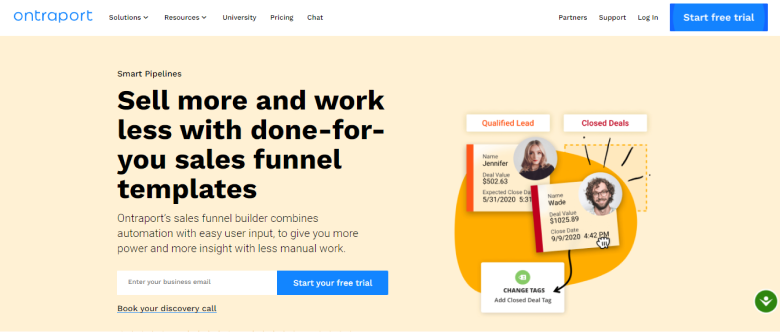
Ontraport goes beyond basic sales funnel creation and offers a comprehensive suite of features to manage your marketing, sales, and customer relationships all in one place.
Pros: E-commerce functionalities and membership site options (availability depends on plan)
Cons: Limited customization options for landing pages and email templates might be a concern for some users.
With over 27k users, Ontraport positions itself as a business automation software designed for entrepreneurs, solopreneurs, and small businesses.
11. WishPond
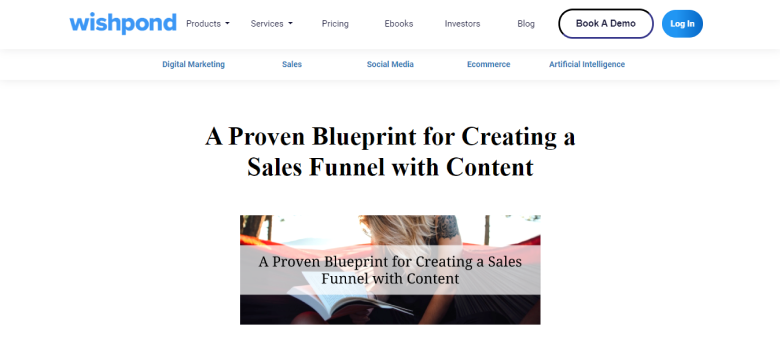
Wishpond is a marketing automation platform that offers features for creating landing pages, running contests and promotions, managing email marketing, and automating marketing workflows.
Pros: All-in-one solution with a focus on lead generation, content creation features, and marketing automation capabilities.
Cons: Limited sales funnel functionalities compared to dedicated builders may require additional resources for managing complex automation workflows.
WishPond, exceeding 16k users, is a good fit for businesses that prioritize lead generation and engagement.
This could include event organizers, marketing agencies running lead-generation campaigns for clients, and businesses in competitive industries needing to stand out.
12. Groove.cm
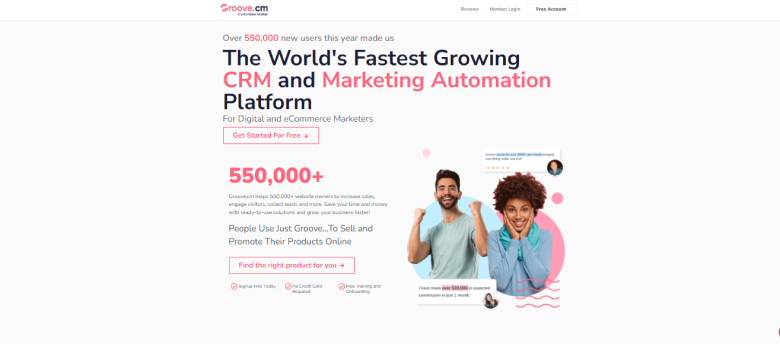
Groove.cm is a customer relationship management (CRM) platform with built-in features for email marketing, chatbots, and helpdesk functionalities.
It’s a good option for businesses seeking a CRM solution with basic marketing automation capabilities.
Pros: Affordable CRM solution with basic marketing automation features, live chat and chatbot functionalities, and a user-friendly interface.
Cons: Limited sales funnel building capabilities, not ideal for complex marketing automation needs.
Groove.cm, used by over 35k users, is suited for startups building their customer base, small businesses with limited marketing needs, and solopreneurs focusing on client communication.
13. Unbounce
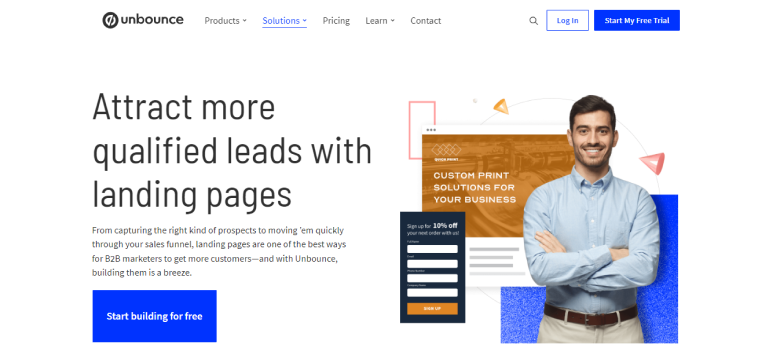
Unbounce is another dedicated landing page builder known for its user-friendly interface and focus on conversion optimization.
It integrates with various marketing tools and allows you to create high-performing landing pages for lead capture and sales funnels.
Pros: User-friendly interface, ideal for creating high-converting landing pages, A/B testing capabilities, integrates with various marketing tools.
Cons: Limited sales funnel functionality compared to all-in-one solutions requires integration with other email marketing and automation tools.
With over 190k users, Unbounce is a good fit for businesses that prioritize high-converting landing pages but don’t necessarily need a complete sales funnel builder.
These could include businesses running specific marketing campaigns, agencies creating landing pages for clients, and e-commerce stores looking to optimize product or campaign pages.
14. ConvertFlow
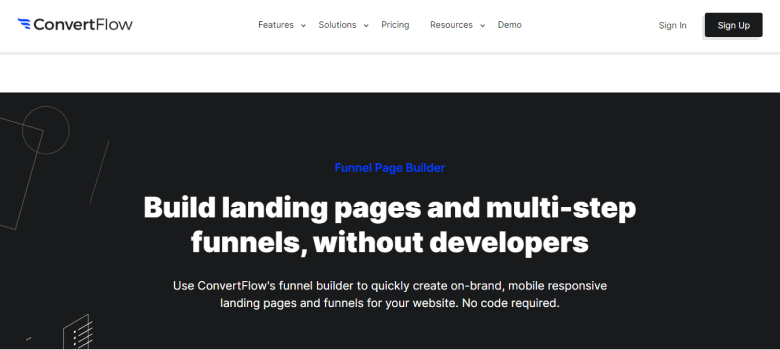
ConvertFlow is a visual sales funnel builder known for its ease of use and focus on conversion optimization.
It integrates seamlessly with popular eCommerce platforms like WooCommerce and Shopify, making it a good option for online stores.
Pros: User-friendly interface, visual sales funnel builder, A/B testing capabilities, integration with eCommerce platforms, website messenger features.
Cons: Limited marketing automation features, compared to some competitors, may not be ideal for large-scale marketing campaigns.
ConvertFlow, used by over 13k users, is suited for businesses that want a user-friendly sales funnel builder.
This could include online stores of all sizes and course creators offering paid content through their websites.
15. ActiveCampaign
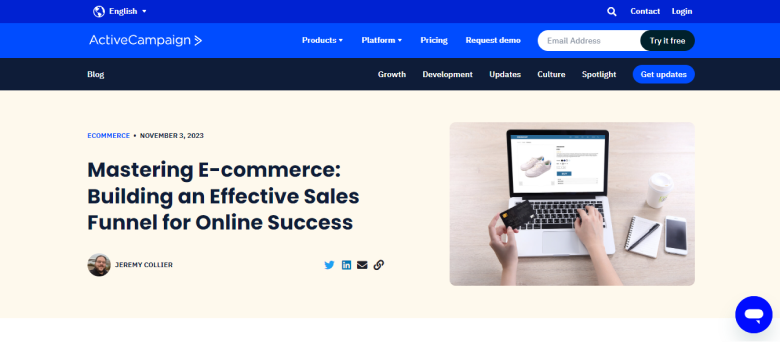
ActiveCampaign is a marketing automation platform with powerful features for building sales funnels, managing email marketing, and automating customer journeys.
It’s a good option for businesses seeking advanced automation capabilities.
Pros: Advanced automation capabilities, personalized customer journey creation, website tracking, and integration with popular CRM systems.
Cons: Pricing can be a barrier to entry compared to some competitors and may require additional resources for managing complex automation workflows.
ActiveCampaign, exceeding 400k users, best caters to e-commerce stores with complex customer journeys, B2B companies with nurture campaigns, and marketing agencies managing multiple client automation.
16. Instapage
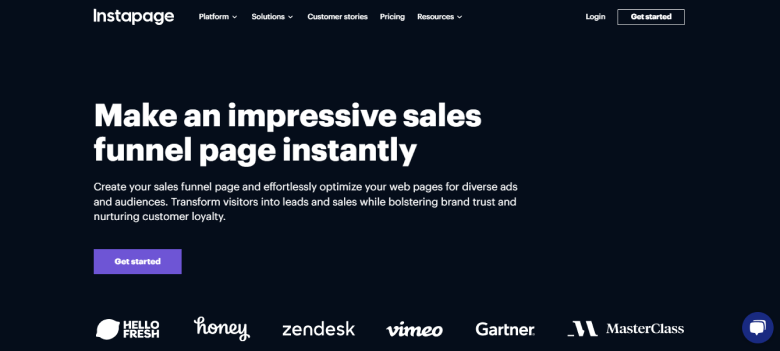
Instapage is a landing page builder known for its speed and mobile-responsive design capabilities.
It integrates with various marketing tools and allows you to create high-performing landing pages for lead capture and sales funnels.
Pros: Focuses on creating landing pages that load quickly and render flawlessly across all devices, ensuring a smooth user experience.
Cons: Requires integration with other marketing tools for email marketing, CRM, and marketing automation functionalities.
Instapage, exceeding 57k users, is a good fit for agencies creating landing pages for clients in competitive industries, and companies running time-sensitive campaigns.
Start Free Trial
Highlight real-time activities like reviews, sales & sign-ups.
How to Choose Right Sales Funnel Software
Selecting the right sales funnel software is akin to picking the foundation for your business’s online growth.
Just like choosing the right materials for a building project, a well-suited software solution empowers you to construct a robust and efficient sales pipeline.
Here’s a breakdown of key considerations to guide your selection process:
Key Considerations When Choosing Sales Funnel Software:
◾ Target Audience
Understanding your ideal customer is the first step. Sales funnel software caters to various industries and business models.
Choosing the right tool depends on who you’re trying to reach and the specific actions you want them to take.
Here’s a glimpse into how different businesses leverage its capabilities:
B2B (Business-to-Business): Nurturing leads is crucial in B2B sales.
Sales funnels help create targeted campaigns with informative landing pages, automated email sequences, and personalized offers to guide potential clients through decision-making.
Local Small Businesses: From capturing leads through engaging landing pages for promotions to automating email marketing for customer loyalty programs, sales funnels empower local businesses to build stronger relationships with their communities and drive local sales.
E-commerce: Creating a seamless buying journey is essential for online stores.
Sales funnels help design high-converting product pages, upsell and downsell offers, and automate abandoned cart recovery emails, ultimately maximizing conversion rates and revenue.
Blogging/Affiliate Marketing: Sales funnels go beyond just selling products.
Bloggers and affiliate marketers can leverage them to capture leads with targeted opt-in forms, deliver valuable content through email sequences, and promote affiliate products or services with high-converting landing pages.
Coaching/Consulting: Building authority and attracting high-value clients is key for coaches and consultants.
Sales funnels help them capture leads through targeted content upgrades, showcase expertise with webinar registrations, and nurture leads with automated email sequences to convert them into paying clients.
Network Marketing: Network marketers can efficiently leverage sales funnels to build their downlines.
They can streamline the recruitment and education process by creating automated lead capture systems, personalized onboarding sequences, and training materials delivery through funnels.
◾ Budget
Sales funnel software pricing varies widely.
Consider both upfront costs and ongoing subscription fees.
While free or low-cost options exist, they might have limitations in features or scalability.
Evaluate your budget realistically and prioritize features that align with your business goals.
Look for free trials or demos to test software functionality before committing to a paid plan.
◾ Features Needed
Landing Page Builder: A drag-and-drop builder allows you to create high-converting landing pages without coding knowledge.
Email Marketing: The ability to send targeted email campaigns, manage email lists, and automate email sequences is essential for nurturing leads and fostering customer relationships.
Automation Capabilities: Automating repetitive tasks like lead scoring, email follow-ups, and abandoned cart recovery can significantly improve efficiency and conversions.
Integrations: Integrating with your existing CRM, marketing automation platform, or webinar software can enhance functionality and streamline workflows.
◾ Ease of Use
Evaluate the learning curve.
Some software offers intuitive interfaces and drag-and-drop functionality, ideal for beginners. Others might require more technical expertise.
Consider your team’s technical skills.
Will your marketing team be comfortable using the software?
Look for customer support options.
Readily available support resources can be invaluable during the onboarding process and troubleshooting.
◾ Scalability
Choose software that can grow with your business.
Look for solutions that offer flexible pricing plans, accommodate increasing user bases, and integrate with other marketing tools you might use in the future.
Consider the software’s ability to handle complex marketing automation workflows as your lead generation efforts scale up.
By carefully evaluating these key considerations, you will be able to select a sales funnel software that serves as a strong foundation for your business’s online success.
Remember, the “right” software is the one that aligns with your specific needs, budget, and future growth aspirations.
Additional Considerations: Optimizing Landing Pages for Conversions
Beyond the powerful automation and structure offered by sales funnel software, don’t underestimate the impact of optimizing individual landing pages within your funnel.
These pages act as the critical touchpoints where visitors convert into paying customers.
By strategically crafting a user experience that builds trust, instills a sense of urgency, and effectively communicates the value proposition, you can significantly boost your conversion rates.
Enter WiserNotify: This valuable tool empowers you to enhance your landing pages with features specifically designed to build trust and urgency, two key psychological factors that influence purchase decisions. Let’s explore how WiserNotify can elevate your landing pages and take your sales funnel to the next level.
Building Trust: Use WiserNotify’s seamless integration with platforms like Google My Business and Facebook Reviews to showcase positive customer reviews directly on your landing pages. This social proof increases trust and convinces hesitant buyers.
Urgency & Scarcity: Leverage WiserNotify’s features like countdown timers for limited-time offers, free shipping notifications, and live visitor counters. These tactics create a sense of urgency and encourage conversions before the “opportunity disappears.
Social Proof Power: WiserNotify lets you display recent sales or a dynamic sales counter, subtly demonstrating product popularity and triggering the fear of missing out (FOMO) in potential customers.
By strategically using WiserNotify’s trust-building and urgency-driving features, you can significantly elevate your landing pages and maximize conversions within your sales funnel.
A/B testing different elements like headlines and CTAs can further refine your landing page for optimal conversions.
